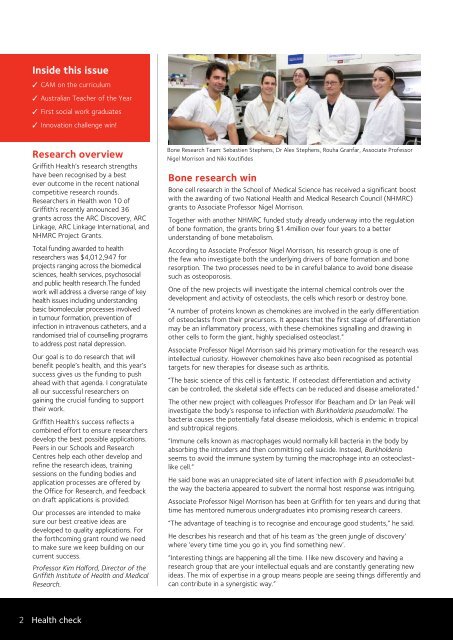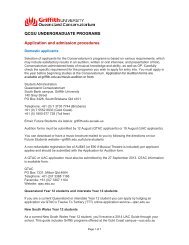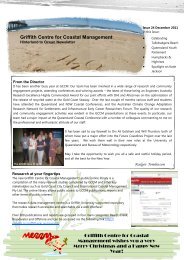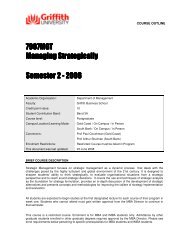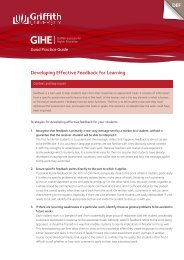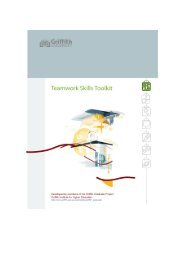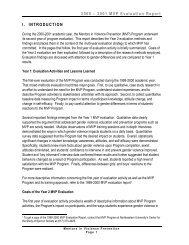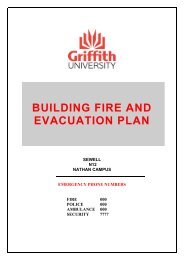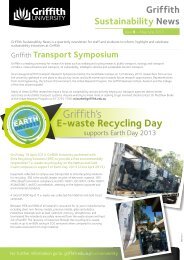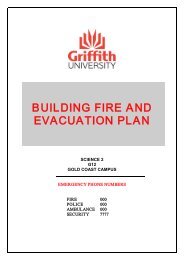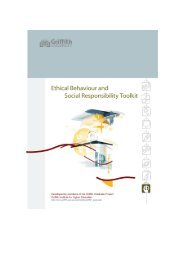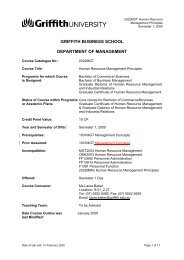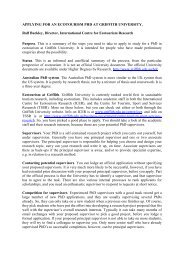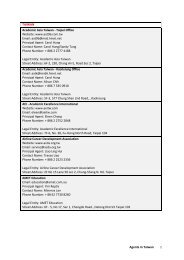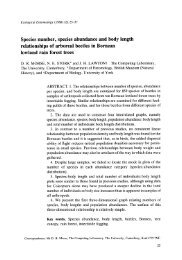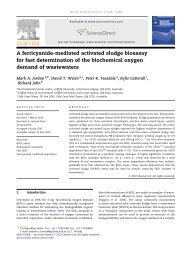Health Check Issue 15 2007 ( PDF 439k) - Griffith University
Health Check Issue 15 2007 ( PDF 439k) - Griffith University
Health Check Issue 15 2007 ( PDF 439k) - Griffith University
Create successful ePaper yourself
Turn your PDF publications into a flip-book with our unique Google optimized e-Paper software.
Inside this issue<br />
3 CAM on the curriculum<br />
3 Australian Teacher of the Year<br />
3 First social work graduates<br />
3 Innovation challenge win!<br />
Research overview<br />
<strong>Griffith</strong> <strong>Health</strong>’s research strengths<br />
have been recognised by a best<br />
ever outcome in the recent national<br />
competitive research rounds.<br />
Researchers in <strong>Health</strong> won 10 of<br />
<strong>Griffith</strong>’s recently announced 36<br />
grants across the ARC Discovery, ARC<br />
Linkage, ARC Linkage International, and<br />
NHMRC Project Grants.<br />
Total funding awarded to health<br />
researchers was $4,012,947 for<br />
projects ranging across the biomedical<br />
sciences, health services, psychosocial<br />
and public health research.The funded<br />
work will address a diverse range of key<br />
health issues including understanding<br />
basic biomolecular processes involved<br />
in tumour formation, prevention of<br />
infection in intravenous catheters, and a<br />
randomised trial of counselling programs<br />
to address post natal depression.<br />
Our goal is to do research that will<br />
benefit people’s health, and this year’s<br />
success gives us the funding to push<br />
ahead with that agenda. I congratulate<br />
all our successful researchers on<br />
gaining the crucial funding to support<br />
their work.<br />
<strong>Griffith</strong> <strong>Health</strong>’s success reflects a<br />
combined effort to ensure researchers<br />
develop the best possible applications.<br />
Peers in our Schools and Research<br />
Centres help each other develop and<br />
refine the research ideas, training<br />
sessions on the funding bodies and<br />
application processes are offered by<br />
the Office for Research, and feedback<br />
on draft applications is provided.<br />
Our processes are intended to make<br />
sure our best creative ideas are<br />
developed to quality applications. For<br />
the forthcoming grant round we need<br />
to make sure we keep building on our<br />
current success.<br />
Professor Kim Halford, Director of the<br />
<strong>Griffith</strong> Institute of <strong>Health</strong> and Medical<br />
Research.<br />
Bone Research Team: Sebastien Stephens, Dr Alex Stephens, Rouha Granfar, Associate Professor<br />
Nigel Morrison and Niki Koutifides<br />
Bone research win<br />
Bone cell research in the School of Medical Science has received a significant boost<br />
with the awarding of two National <strong>Health</strong> and Medical Research Council (NHMRC)<br />
grants to Associate Professor Nigel Morrison.<br />
Together with another NHMRC funded study already underway into the regulation<br />
of bone formation, the grants bring $1.4million over four years to a better<br />
understanding of bone metabolism.<br />
According to Associate Professor Nigel Morrison, his research group is one of<br />
the few who investigate both the underlying drivers of bone formation and bone<br />
resorption. The two processes need to be in careful balance to avoid bone disease<br />
such as osteoporosis.<br />
One of the new projects will investigate the internal chemical controls over the<br />
development and activity of osteoclasts, the cells which resorb or destroy bone.<br />
“A number of proteins known as chemokines are involved in the early differentiation<br />
of osteoclasts from their precursors. It appears that the first stage of differentiation<br />
may be an inflammatory process, with these chemokines signalling and drawing in<br />
other cells to form the giant, highly specialised osteoclast.”<br />
Associate Professor Nigel Morrison said his primary motivation for the research was<br />
intellectual curiosity. However chemokines have also been recognised as potential<br />
targets for new therapies for disease such as arthritis.<br />
“The basic science of this cell is fantastic. If osteoclast differentiation and activity<br />
can be controlled, the skeletal side effects can be reduced and disease ameliorated.”<br />
The other new project with colleagues Professor Ifor Beacham and Dr Ian Peak will<br />
investigate the body’s response to infection with Burkholderia pseudomallei. The<br />
bacteria causes the potentially fatal disease melioidosis, which is endemic in tropical<br />
and subtropical regions.<br />
“Immune cells known as macrophages would normally kill bacteria in the body by<br />
absorbing the intruders and then committing cell suicide. Instead, Burkholderia<br />
seems to avoid the immune system by turning the macrophage into an osteoclastlike<br />
cell.”<br />
He said bone was an unappreciated site of latent infection with B pseudomallei but<br />
the way the bacteria appeared to subvert the normal host response was intriguing.<br />
Associate Professor Nigel Morrison has been at <strong>Griffith</strong> for ten years and during that<br />
time has mentored numerous undergraduates into promising research careers.<br />
“The advantage of teaching is to recognise and encourage good students,” he said.<br />
He describes his research and that of his team as ‘the green jungle of discovery’<br />
where ‘every time time you go in, you find something new’.<br />
“Interesting things are happening all the time. I like new discovery and having a<br />
research group that are your intellectual equals and are constantly generating new<br />
ideas. The mix of expertise in a group means people are seeing things differently and<br />
can contribute in a synergistic way.”<br />
2<br />
<strong>Health</strong> check


